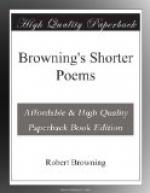The Grammarian is a type of the early scholars who gave to Europe the treasures of Greek thought by translating the manuscripts recovered after the fall of Constantinople. The time is therefore the Renaissance, the latter part of the fifteenth century, and the place probably Italy. The Grammarian was a scholar and thinker, not a mere student of grammar in the modern sense.
23. =Our low life=. Lacking the learning and high endeavor of their master.
45-46. =the world bent on escaping=. That is, the world of the past.
48. =shaping=, their mind and character.
97-98. Compare with lines 65-72, 77-84, and 103-4.
129-131. The Greek particles [Greek: oti, oun, and de.]
Describe the scene and action of the poem. Note the march-like and irregular movement of the verse: does it fit the theme? Why do they carry the Grammarian up from the plain? What was his work? What was his aim? What is the value of such work (1) in presenting an ideal of life, (2) in the history of culture? What circumstances in his life enhance his praise? Did he make any mistake? Does Browning think so? How does Browning defend him? What imagery in the poem seems especially effective? Are you reminded of anything in “Rabbi Ben Ezra”? Criticise the rhymes and metre.
ANDREA DEL SARTO. (PAGE 149.)
An Italian painter, of the Florentine school; born 1487, died 1531. His merits and defects as an artist are given in the poem. The crime to which he is here made to refer was the use, for building himself a house, of the money intrusted to him by the French king for the purchase of works of art. For an account of his life and work see the article in the Encyclopaedia Britannica, and Vasari’s Lives of the Painters.
15. =Fiesole= (pronounced Fe-[=’a]-so-l[ve]). A small Italian town near Florence.
119. =Rafael=. The great painter, Raphael (1483-1520).
130. =Agnolo=. Michael Angelo (1475-1584), one of Italy’s greatest men: famous as sculptor, painter, architect, and poet.
150. =Fontainebleau=. A town southeast of Paris, formerly the residence of French kings, and still famous for its Renaissance architecture and for the landscapes around it.
241. =scudi=. The scudo is an Italian silver coin worth about one dollar.
262. =Leonard=. Leonardo da Vinci (1452-1519), another of Italy’s great men: artist, poet, musician, and scientist.
Construct the scene and action of the poem. How does the coloring harmonize with the artist’s mood? Why is he weary? How does he think of his art: what merit has it? What does it lack? How does he explain this lack? What clew to it does his life afford? Is his art soulless because he has done wrong? Or, do the lack of soul in his painting, and the wrongdoing, and the infatuation with Lucrezia’s beauty, all arise from the same thing,—the man’s own nature? Does he appeal to your sympathy, or provoke your condemnation? Does he blame himself, or another, or circumstances?




